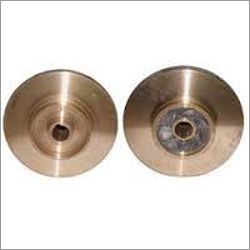Non Ferrous Impeller
Product Details:
- Usage Industrial
- Product Type Non Ferrous Impeller
- Material Aluminum
- Click to View more
Non Ferrous Impeller Product Specifications
- Industrial
- Non Ferrous Impeller
- Aluminum
Non Ferrous Impeller Trade Information
- All India
Product Description
The following non-ferrous materials are frequently used for impellers:
1. Bronze is an alloy predominantly made of copper, with tin and occasionally other elements added. Bronze impellers have a high strength, strong wear resistance, and great corrosion resistance. They are frequently utilised in situations where water, ocean, or corrosive fluids are present.
2. Brass: Copper and zinc make up the majority of the alloy that is brass. Brass impellers offer moderate strength, decent corrosion resistance, and ease of machining. They are appropriate for uses that call for compatibility with water, mild chemicals, or slow-moving fluids.
3. Aluminium: Lightweight impeller alternatives include aluminium and aluminium alloys. They have great thermal conductivity, low density, and good corrosion resistance. In applications where weight reduction or thermal control are crucial, like automotive cooling systems, aluminium impellers are frequently employed.
4. Stainless Steel: Despite containing iron, stainless steel is classified as non-ferrous because it has a far lower iron content than ferrous materials. Impellers made of stainless steel are extremely durable, strong, and resistant to corrosion. They are frequently utilised in situations where harsh chemicals, high temperatures, or abrasive fluids are present.
The choice of a non-ferrous material for an impeller is influenced by various elements, including the application in question, the fluid's properties, the working environment (temperature, pressure), and compatibility with the fluid in question. To make sure the impeller material can endure the specified conditions, it is crucial to take into account the fluid's corrosiveness, temperature restrictions, and any other particular needs.
Non-ferrous impellers are used in a variety of fields where reliable fluid handling and corrosion resistance are essential, including water and wastewater treatment, oil & gas, chemical processing, HVAC systems, and more.
| Brand | SELF MANFACTRURE |
| Material | ALL METAL |
| Usage/Application | Industrial |
| Closing Type | Closed |
| Finish | Coated |
| Structure Type | Multistage |
| Impeller Blade Type | Radial |
| Impellers Type | Double-Suction |
| Size/ Dimensions | AS PER REQUIREMENT |
| Frequency | AS PER REQUIREMENT |
| Voltage | AS PER REQUIREMENT |
| Color | AS PER REQUIREMENT |
| Impeller Diameter | AS PER REQUIREMENT |
| Pump Power | AS PER REQUIREMENT |
| Compressor Type | AS PER REQUIREMENT |
| Dimensions | AS PER REQUIREMENT |
| Motor Power | AS PER REQUIREMENT |
| Motor Speed Rpm | AS PER REQUIREMENT |
Applications:
- Pharmaceutical Industry
- Thermal Processing Industry
- Size: Customized
FAQ
1. A non-ferrous impeller is what?
Ans - An impeller constructed of a non-ferrous metal, such as Aluminium, Brass, Copper, or Stainless Steel, is known as a non-ferrous impeller. This kind of impeller is used frequently in applications that need a better resilience to wear and demanding environments since it is less prone to corrosion.
2. What benefits do non-ferrous impellers offer?
Ans - Non-ferrous impellers have higher corrosion resistance in addition to being lighter and easier to handle in confined locations. They may also be easily machined for precision engineering. In comparison to ferrous impellers, they often require less maintenance and have longer lifespans.
3. What kinds of uses are non-ferrous impellers frequently employed in?
Ans - In industrial, automotive, marine, and agricultural applications where improved chemical and/or temperature resistance is required, non-ferrous impellers are frequently employed.
4. Does utilising a non-ferrous impeller have any drawbacks?
Ans - For some applications, non-ferrous impellers might not be the most cost-effective choice because they are often more expensive than ferrous impellers. Furthermore, some non-ferrous materials are vulnerable to galling, which might shorten the impeller's lifespan.
5. Is there a method to make a non-ferrous impeller last longer?
Ans - A non-ferrous impeller can be maintained in a variety of ways to increase its lifespan. Corrosion and metal fatigue can be prevented with routine maintenance and inspections. Furthermore, the danger of galling and other friction-related harm can be decreased with sufficient lubrication.

Price:
- 50
- 100
- 200
- 250
- 500
- 1000+


 Send Inquiry
Send Inquiry Send SMS
Send SMS Call Me Free
Call Me Free
